Emergency HVAC Llanharry
Find top 24/7 HVAC Repair in Llanharry
Receive multiple Emergency HVAC Service quotes for your project today! Compare profiles, reviews, accreditations, portfolio, etc... and choose the best deal.
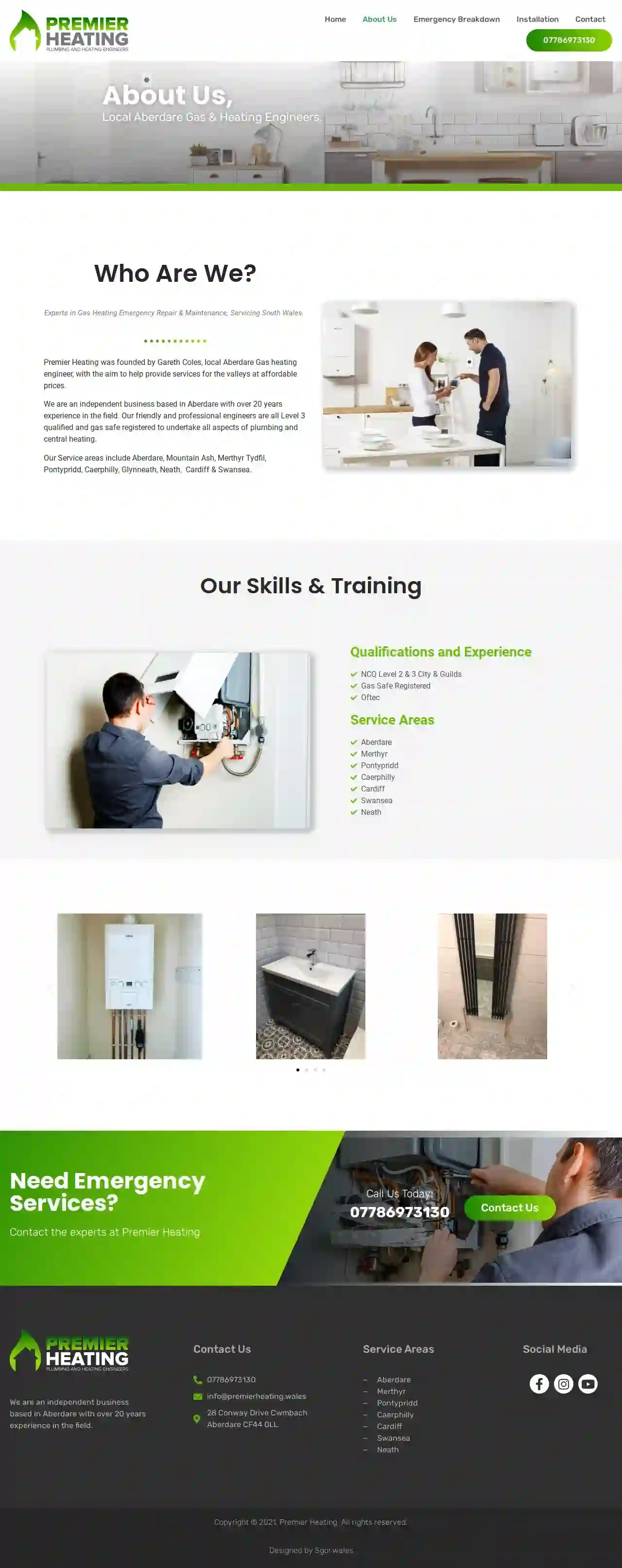
Premier Heating
28 Conway Drive Cwmbach Aberdare, Aberdare, CF44 0LL, GBPremier Heating is a local Aberdare Gas & Heating Engineers company, founded by Gareth Coles, with over 20 years of experience in the field. We are an independent business based in Aberdare, providing services for the valleys at affordable prices. Our friendly and professional engineers are all Level 3 qualified and Gas Safe registered to undertake all aspects of plumbing and central heating. Our service areas include Aberdare, Mountain Ash, Merthyr Tydfil, Pontypridd, Caerphilly, Glynneath, Neath, Cardiff, and Swansea.
- Services
- Why Us?
- Accreditations
- Our Team
- Gallery
Get Quote
Principality Windows Ltd
4.746 reviewsPontypridd, GBPrincipality Windows is a FENSA registered double glazing company with over 30 years of experience in installing windows, doors and conservatories. We are dedicated to providing a first-class professional service to the people of South Wales and surrounding areas. Our team of professional window fitters are committed to delivering high-quality products and services, whether it's a small job or a large project. We offer a wide range of uPVC and Aluminium windows, including Vertical Sliding (Box Sash), Casement, Bay, Tilt & Turn, Arched, Round and Angled windows. We also supply and install Composite Front, Back, Stable style, Patio, Bi-folding, and French doors. In addition to new installations, we also offer repairs and glass replacement services for existing windows and doors. At Principality Windows, we understand that choosing new windows and doors is a significant investment. That's why we strive to make the process as smooth as possible for our customers. From the initial consultation to the final installation, we are dedicated to providing expert advice, competitive pricing, and exceptional customer service. We pride ourselves on using only the best quality products from reputable manufacturers. All of our installations are covered by a 10-year insurance backed guarantee, giving you peace of mind knowing that your investment is protected. If you're looking for high-quality windows and doors in South Wales, look no further than Principality Windows. Contact us today for a free, no-obligation quote.
- Services
- Why Us?
- Accreditations
- Our Team
- Gallery
Get Quote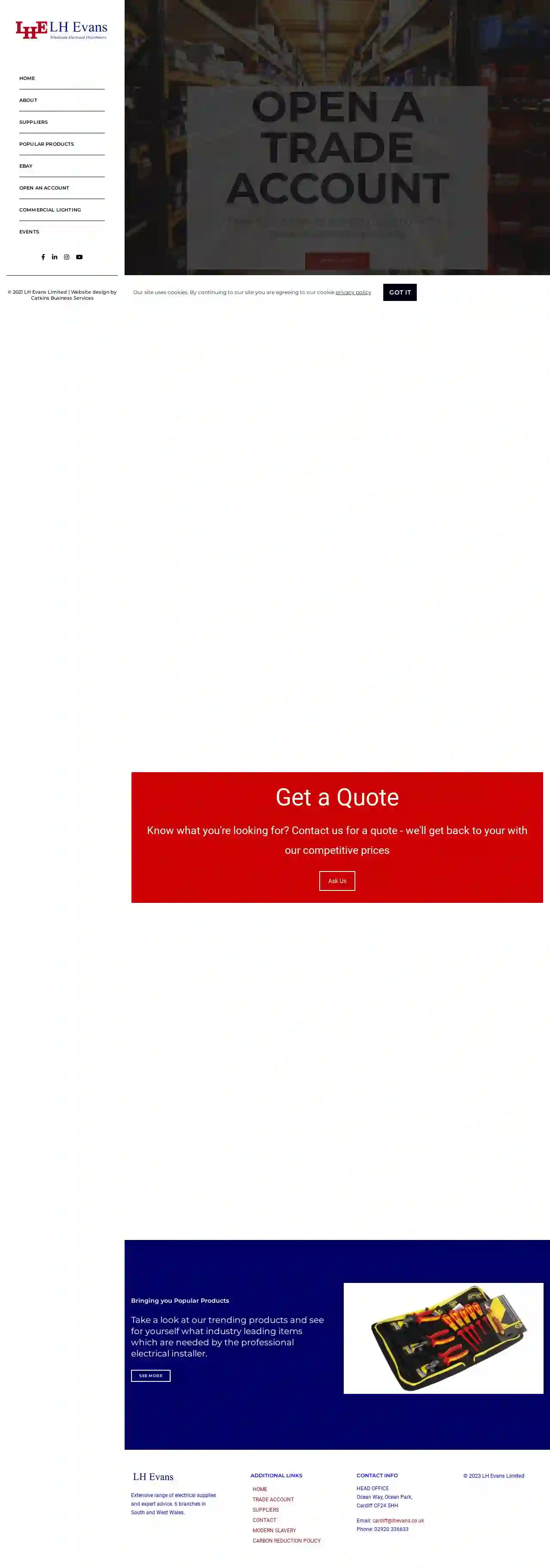
LH Evans Aberdare
41 reviewsOcean Way, Ocean Park, Cardiff, CF24 5HH, GBLH Evans is a family-run electrical wholesale business with over 60 years of experience serving customers across South Wales and the West. Founded in 1962 by Lynn Evans, the company has grown from humble beginnings on a Welsh farm to a multi-branch operation with a central warehouse and head office in Cardiff. LH Evans prides itself on its long-serving and knowledgeable staff, excellent same and next day delivery services, professional product knowledge, and outstanding customer service. They offer a wide range of electrical supplies and expert advice, with dedicated local sales teams ready to assist with any product questions or quotation requests. LH Evans also operates six convenient branches across South Wales and the West, open six days a week to both trade and the public. In addition to their core electrical wholesale business, LH Evans also offers a variety of lighting services, including luxury lighting showrooms and extensive commercial design services. For more information on their lighting showrooms, visit www.emalighting.co.uk. LH Evans is committed to responsible waste management and is a registered upper tier waste carrier with Natural Resources Wales. They also serve as an official Recolight Collection Point, ensuring the proper disposal of lamps.
- Services
- Why Us?
- Accreditations
- Gallery
Get Quote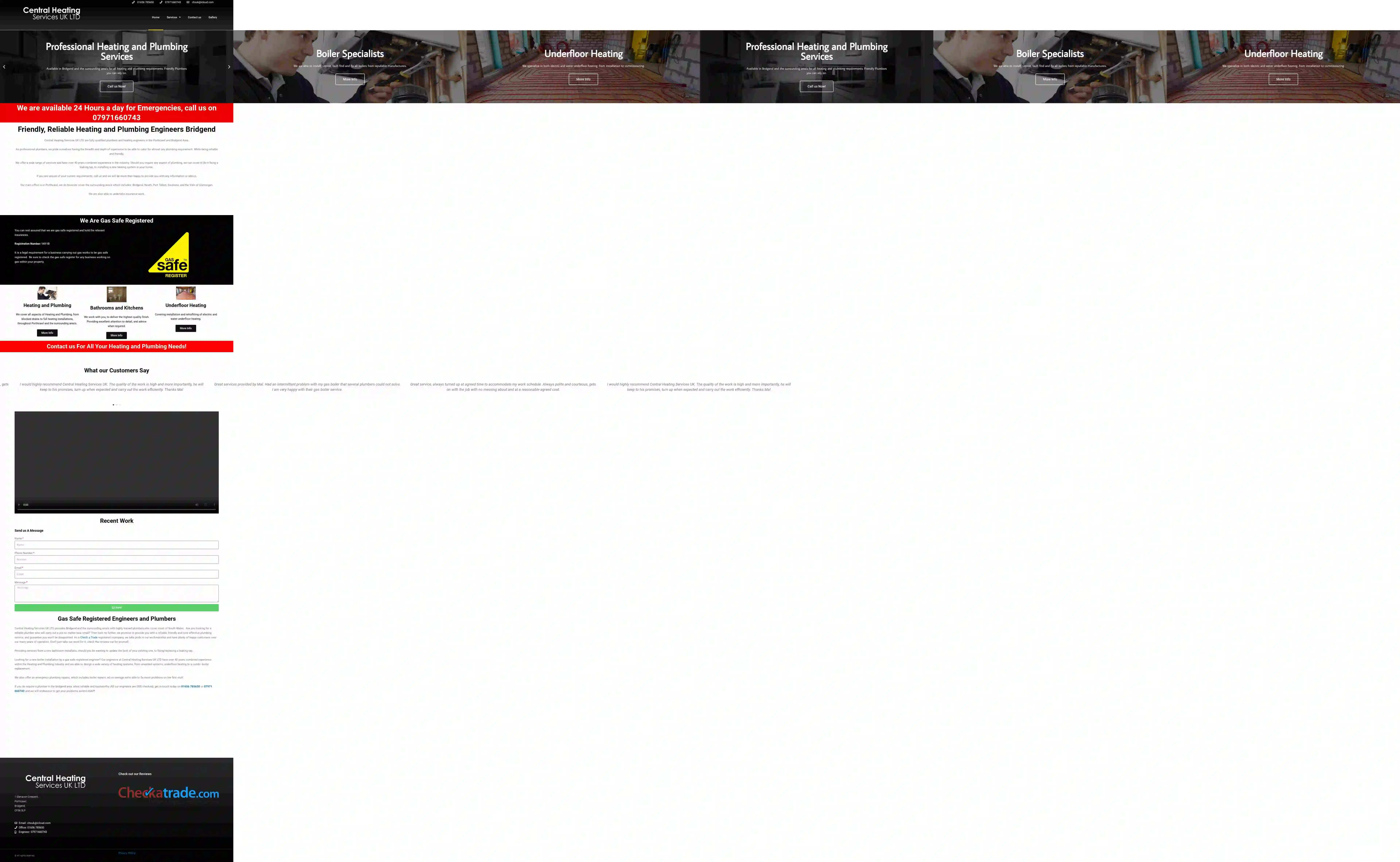
Central Heating Services Uk Ltd
4.517 reviews1 Glenavon Crescent, Porhtcawl, CF36 3LP, GBProfessional Heating and Plumbing Services Available in Bridgend and the surrounding area's for all heating and plumbing requirements. Friendly Plumbers you can rely on. Call us Now! Boiler Specialists We are able to install, service, fault find and fix all boilers from reputable manufacturers. More Info Underfloor Heating We specialize in both electric and water underfloor heating, from installation to commissioning.More Info We are available 24 Hours a day for Emergencies, call us on 07971660743 Friendly, Reliable Heating and Plumbing Engineers Bridgend Central Heating Services UK LTD are fully qualified plumbers and heating engineers in the Porthcawl and Bridgend Area. As professional plumbers, we pride ourselves having the breadth and depth of experience to be able to cater for almost any plumbing requirement. While being reliable and friendly. We offer a wide range of services and have over 40 years combined experience in the industry. Should you require any aspect of plumbing, we can cover it! Be it fixing a leaking tap, to installing a new heating system in your home. If you are unsure of your current requirements, call us and we will be more than happy to provide you with any information or advice. Our main office is in Porthcawl, we do however cover the surrounding area’s which includes: Bridgend, Neath, Port Talbot, Swansea, and the Vale of Glamorgan. We are also able to undertake insurance work. We Are Gas Safe Registered You can rest assured that we are gas safe registered and hold the relevant insurances. Registration Number: 14110 It is a legal requirement for a business carrying out gas works to be gas safe registered. Be sure to check the gas safe register for any business working on gas within your property. Heating and Plumbing We cover all aspects of Heating and Plumbing, from blocked drains to full heating installations, throughout Porthcawl and the surrounding area's. More Info Bathrooms and Kitchens We work with you, to deliver the highest quality finish. Providing excellent attention to detail, and advice when required. More Info Underfloor Heating Covering installation and retrofitting of electric and water underfloor heating. More Info Contact us For All Your Heating and Plumbing Needs!
- Services
- Why Us?
- Accreditations
- Our Team
- Testimonials
- Gallery
Get Quote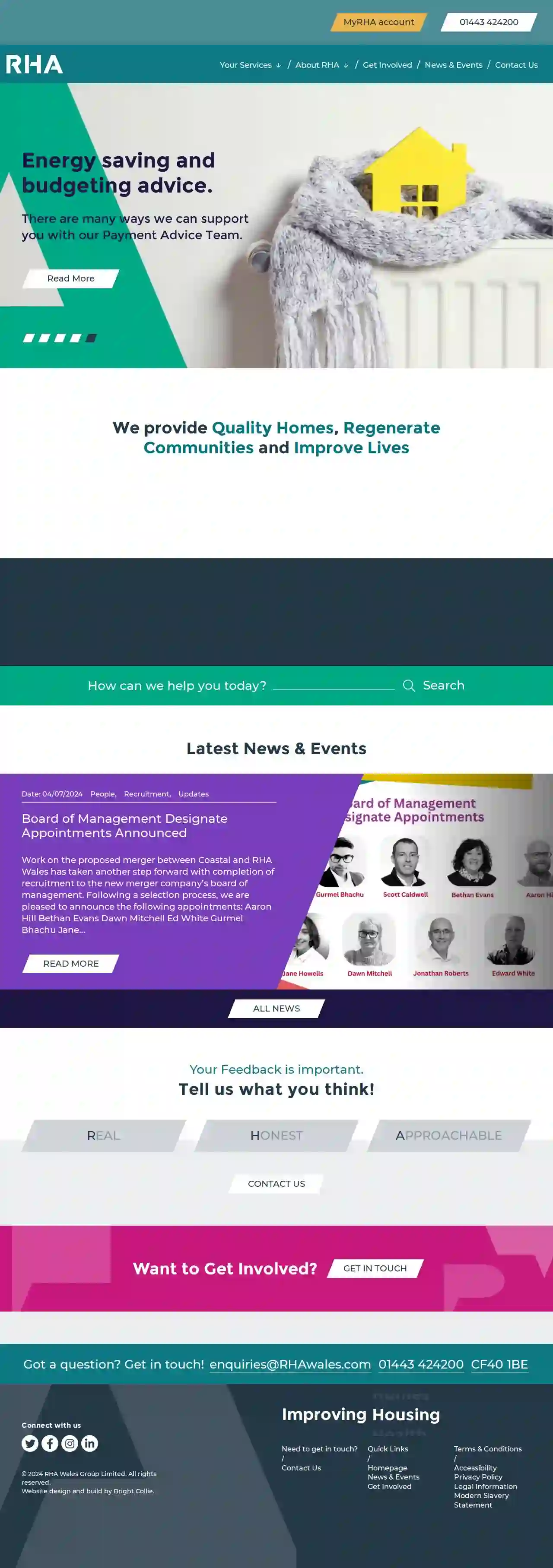
Rhondda Housing Association
3.547 reviewsHigh Street, Pontypridd, The Little Shed, 10-12, CF40 1BE, GBRHA Wales is a leading housing association dedicated to providing quality homes and improving lives across Wales. We are committed to regenerating communities and creating thriving spaces where people can live, work, and grow. Our mission is to deliver exceptional customer service, build strong relationships with our tenants, and make a positive impact on the lives of the people we serve. With a rich history of providing affordable housing, RHA Wales has a proven track record of success. We have a dedicated team of professionals who are passionate about making a difference. Our expertise spans a wide range of areas, including: Rent and Housing Management: We offer a range of affordable rent options and provide comprehensive housing management services to ensure our tenants have a safe and comfortable place to call home. Repairs and Improvements: We are committed to maintaining our properties to a high standard and providing prompt and efficient repairs. We also invest in planned improvements to enhance the quality of our homes and communities. Advice and Support: We offer a range of advice and support services to help our tenants with issues such as budgeting, energy saving, and home safety. Community Engagement: We believe in working closely with our communities to understand their needs and deliver services that make a real difference. We actively engage with local residents, businesses, and organizations to create thriving and inclusive communities. At RHA Wales, we are committed to: Providing quality homes that meet the needs of our tenants. Delivering exceptional customer service. Regenerating communities and creating thriving spaces. Improving the lives of the people we serve.
- Services
- Why Us?
- Accreditations
- Gallery
Get Quote
Asda Aberdare Superstore
3.5275 reviewsRiverside Retail Park, Aberdare, CF44 0AH, GBASDA Aberdare is a grocery store located in Riverside Retail Park, Aberdare, CF44 0AH, GB. The store offers a range of services including Drive Thru Collection Point, Pharmacy, Opticians, Cafe, and Travel Money Bureau. The store is accessible and has facilities such as accessible toilet, adapted cutlery, and mobility scooters. The store hours are 7:00 AM - 10:00 PM Monday to Saturday and 10:00 AM - 4:00 PM on Sunday. The store also offers Scan & Go service and Speedy delivery in as little as 1 hour.
- Services
- Why Us?
- Gallery
Get Quote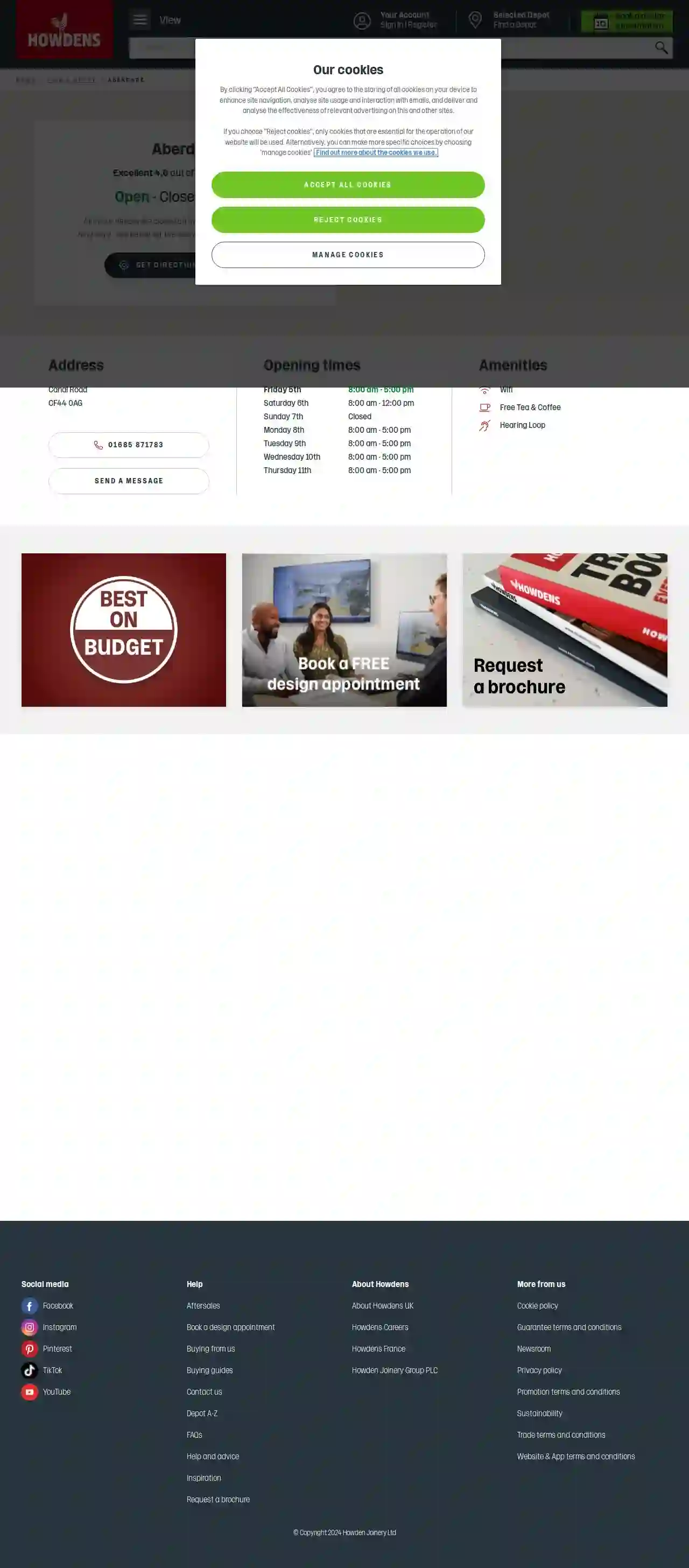
Howdens - Aberdare
4.651 reviewsAberdare, GBHowdens is the UK's Number 1 Trade Kitchen Supplier, operating in the UK, Republic of Ireland, France, and Belgium. With hundreds of depots nationwide, you are always within easy reach of a local Howdens, where you can talk to someone in person about your query. Our friendly and knowledgeable depot staff can help with a wide range of topics, from product information to fitting advice, account registrations, and design services, plus details about appliance registrations.
- Services
- Why Us?
- Accreditations
- Our Team
- Testimonials
- Gallery
Get Quote
Flame and go Limited
528 reviewsPontypridd, GBWith over 15 years experience in plumbing and heating, Flame and Go offer a wide range in plumbing services throughout South Wales. We've got you covered from a leaking tap to a full central heating system. Our engineers are fully qualified in all aspects of our work, undergoing regular training in the most efficient boilers and plumbing solutions. Flame and Go are proud to offer a premium service at a competitive price.
- Services
- Why Us?
- Gallery
Get Quote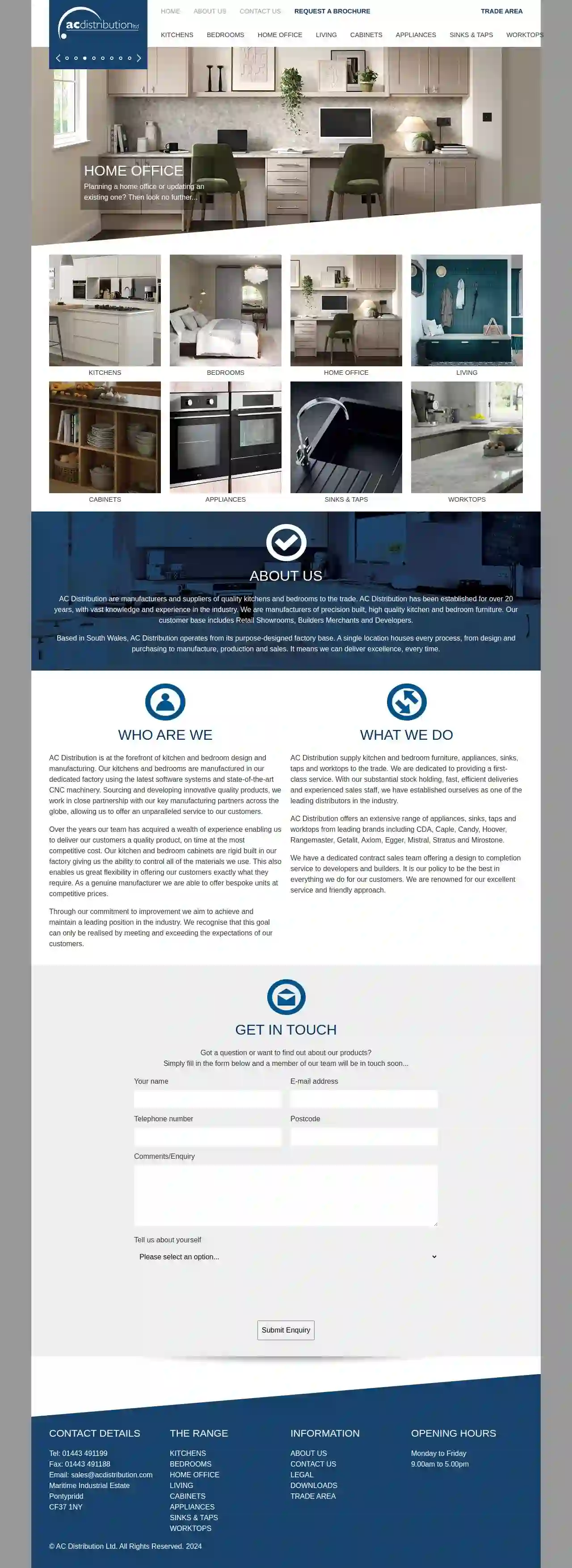
A C Distribution Ltd
3.919 reviewsMaritime Industrial Estate, Pontypridd, CF37 1NY, GBAC Distribution are manufacturers and suppliers of quality kitchens and bedrooms to the trade. AC Distribution has been established for over 20 years, with vast knowledge and experience in the industry. We are manufacturers of precision built, high quality kitchen and bedroom furniture. Our customer base includes Retail Showrooms, Builders Merchants and Developers. Based in South Wales, AC Distribution operates from its purpose-designed factory base. A single location houses every process, from design and purchasing to manufacture, production and sales. It means we can deliver excellence, every time. WHO ARE WE AC Distribution is at the forefront of kitchen and bedroom design and manufacturing. Our kitchens and bedrooms are manufactured in our dedicated factory using the latest software systems and state-of-the-art CNC machinery. Sourcing and developing innovative quality products, we work in close partnership with our key manufacturing partners across the globe, allowing us to offer an unparalleled service to our customers. Over the years our team has acquired a wealth of experience enabling us to deliver our customers a quality product, on time at the most competitive cost. Our kitchen and bedroom cabinets are rigid built in our factory giving us the ability to control all of the materials we use. This also enables us great flexibility in offering our customers exactly what they require. As a genuine manufacturer we are able to offer bespoke units at competitive prices. Through our commitment to improvement we aim to achieve and maintain a leading position in the industry. We recognise that this goal can only be realised by meeting and exceeding the expectations of our customers. WHAT WE DO AC Distribution supply kitchen and bedroom furniture, appliances, sinks, taps and worktops to the trade. We are dedicated to providing a first-class service. With our substantial stock holding, fast, efficient deliveries and experienced sales staff, we have established ourselves as one of the leading distributors in the industry. AC Distribution offers an extensive range of appliances, sinks, taps and worktops from leading brands including CDA, Caple, Axiom, Egger, Mistral, Stratus and Prima. We have a dedicated contract sales team offering a design to completion service to developers and builders. It is our policy to be the best in everything we do for our customers. We are renowned for our excellent service and friendly approach.
- Services
- Why Us?
- Gallery
Get Quote
Heatlink Mechanical Engineering
Unit 1a Whitebeam Court Rhodfa, Ty Du Road, Nelson, CF46 6PQ, GBHeatlink (Mechanical) Limited are a South Wales based mechanical and electrical contractor operating within a large range of sectors including commercial, residential, industrial, education and healthcare. From our offices in Cardiff South Wales, we carry out work within the South and West country. We offer a full range of services from specification build, design development and full design and installation to full post contract maintenance services. We undertake work on a design and build, specification or bill of quantities basis. We carry out works for a large number of consultants, contractors and private clients and pride ourselves on the repeat business we achieve.
- Services
- Why Us?
- Gallery
Get Quote
Over 12,692+ HVAC Companies registered
Our HVAC pros operate in Llanharry & surrounding areas!
HVACCompaniesHub has curated and vetted Top HVAC Contractors in and around Llanharry. Find a top & reliable contractor today.
Frequently Asked Questions About Emergency HVAC Services
- Uneven Temperatures: Some rooms in your house might be significantly hotter or colder than others.
- High Energy Bills: An undersized or oversized system will work harder and consume more energy.
- Frequent Cycling: An oversized system will turn on and off too frequently, reducing its lifespan.
- Poor Humidity Control: The system may not effectively control humidity levels, leading to discomfort or mold problems.
Are emergency HVAC services more expensive?
How can I tell if my HVAC system is the correct size for my home?
How long does it take for an emergency HVAC technician to arrive?
What is carbon monoxide, and how can it affect my HVAC system?
Are emergency HVAC services more expensive?
How can I tell if my HVAC system is the correct size for my home?
- Uneven Temperatures: Some rooms in your house might be significantly hotter or colder than others.
- High Energy Bills: An undersized or oversized system will work harder and consume more energy.
- Frequent Cycling: An oversized system will turn on and off too frequently, reducing its lifespan.
- Poor Humidity Control: Incorrect sizing can cause inadequate humidity control.